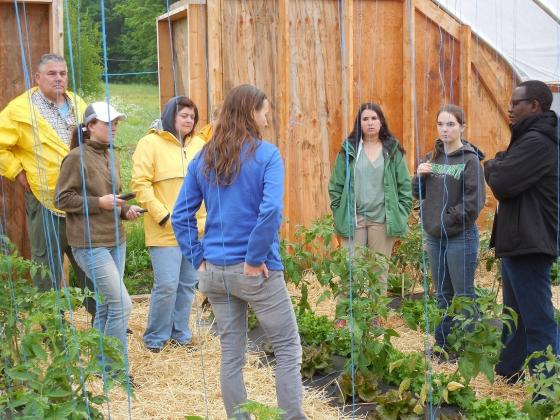Posted March 17, 2022 at 10:36am by Anonymous (not verified)
Lessons from Students: Making the Most of Vermont’s Food Web

Written by Vicky Tebbets
Students from around the country plunged into a whirlwind tour of Vermont last June with one goal: immersion in Vermont’s food systems. For 21 intensive days they traveled 404 miles, learned from leaders at five colleges, one university, and a law school, and spent 54 afternoon hours at 21 food systems field destinations. “Vermont is this little ivory tower of enlightenment in the Northeastern part of the United States,” they said.
With backpack, laptop, and smartphone in hand, these students were the heart of the Vermont Food Systems Summer Study Tour, a project of the Vermont Higher Education Food Systems Consortium (VHEFSC). Comprised of Green Mountain College, Middlebury College, New England Culinary Institute, Sterling College, University of Vermont , Vermont Law School, and Vermont Tech, the VHEFSC advances food and farm education in Vermont.
Ultimately, Vermont food and farm education strengthens Vermont’s food system, motivates food-based startups, and increases communication among Vermont’s food businesses – all goals of Vermont’s Farm to Plate food system plan. By claiming Vermont’s place as the catalyst of the country’s food system renaissance, Vermont higher education is inspiring a new, networked global community of leaders to change the way we think about, cultivate, and influence food systems.
To complement schools’ recruiting efforts, this autumn the VHEFSC launched the “Apply Yourself” campaign with the message that food and farm education in Vermont is hands-on, diverse, important, and even a pivotal part of students’ education. An interactive map chronicles insights about food, farming, and learning in Vermont. Here are some of the Summer Study Tour students’ revelations, through their eyes and in their words.
We Stand United, the Vermont Way. Keys to success include strong support from the state government and elected officials, Vermont values-driven programming, a viable landscape for food production, community participation, and cooperation among various public, private, and non-profit groups.
Real People, Real Food, Real Change. Food insecurity can't be solved with charity. Through charity we are addressing the symptom and not attacking the problem. Within those organizations charity must be augmented with opportunities for empowerment and they must influence policy makers to address the inequities.
We are Deeply Connected. The connection that Vermont farmers and farm families feel to the earth and the region in general astounds me...they are knowledgeable about the health of the working land and are committed to maintaining it to the best of their ability. What became increasingly clear to me throughout the three weeks was the amount of positive influence and change one person can have within a community.
Hard Work, True Hearts. I felt as if I had truly discovered the essence of a Vermonter right from the start of the day. These people work hard, believe in what they do, support each other, and carry with them a set of morals and high standards which is desperately needed in such a complicated and diverse food system.
Vermont is our Classroom: We spoke about what is happening on the ground beneath our feet and how it effects everything else that is happening around us… I know I must lead a more sustainable lifestyle that is more connected to our land than the one I've known all my life.
A Vermont Education is Vital. Before coming to Vermont, I spent much more time thinking and reading about the consumer side of food systems than the producer side, as well as more about fruits and vegetables than about dairy and livestock. I've certainly been pulled out of my comfort zone. I've always known that a basic understanding of rural, agricultural communities and how food is produced would be vital for a career in food policy.
The Themes of Challenge and Success. Most themes relate to aspects of food systems: defining values, supporting farmers, helping children and adults make behavioral changes regarding food, and the importance of partnerships and collaboration. We have also been hearing food systems challenges repeating themselves: high costs of local food, small and local farms not being able to produce enough to keep up with institutions' demands, seasonality, lack of infrastructure for distribution and storage, and defining and prioritizing different types of values without being contradictory or imposing on others.
Vermont students discover that when you learn in Vermont, you become part of a larger community of leaders, researchers, and catalysts for the sustainability and integrity of global food systems. For a dozen students last summer, this enlightenment became an honor, a burden, and an epiphany as they examined their own ethics, engaged in critical conversations, and shared their insights on making the most of Vermont’s food web.
Plans are underway for the June 2016 Vermont Food Systems Summer Study Tour. For undergraduate and graduate credit, students will once again be invited to experience a Tour like never before. Check http://www.vermontfoodeducation.org/ for news and application information.
